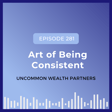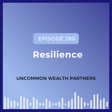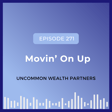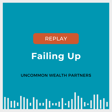Become a Creator today!Start creating today - Share your story with the world!
Start for free
00:00:00
00:00:01

Failing Up
In this episode of the Uncommon Wealth Podcast, hosts Phillip Ramsey and Arron Cramer tackle the often unspoken topic of failure and its critical role in shaping successful lives and careers. The hosts delve into personal stories of setbacks and missteps, drawing from their own experiences to illustrate how failures, rather than hindrances, can serve as crucial stepping stones to growth and resilience. This candid discussion aims to de-stigmatize failure and highlight its importance on the path to uncommon wealth and life satisfaction.
Key Takeaways:
- Embracing Failure: Understanding that failure is an integral part of personal and professional growth.
- Learning from Setbacks: Using failures as opportunities to gain insights and improve future decisions and actions.
- Self-Awareness: The importance of recognizing and addressing personal weaknesses and setting healthy boundaries.
- Hard Conversations: The necessity of having honest and difficult discussions to foster growth and resolve issues.
- Value of Resilience: Building resilience through consistent self-reflection and perseverance despite challenges.
Recommended
Transcript
Living an Uncommon Life
00:00:00
Speaker
Everyone dreams of living an uncommon life. And the best asset you have to achieve your dreams is you. Welcome to the Uncommon Wealth Podcast. We're going to introduce you to people who are living uncommonly. We're also going to give you some tools and strategies for building wealth and for pursuing an uncommon path that is uniquely right for you.
00:00:27
Speaker
Hello and welcome everybody to another episode of the Uncommon Wealth Podcast, where I'm your host, Philip Ramsey. And I'm Aaron Kramer. Thank you for tuning in. Today we have an interesting topic. It's just Aaron and I hanging out. And we've been talking about this concept. And i've we've seen it. We've witnessed it. And we've seen how powerful this can be. Yep. You ready for this?
The Role of Failures in Personal Growth
00:00:46
Speaker
We're talking about failures. Failures. Being human. Being human and failing. Yeah. And we'll just start by saying, we're going to talk about our failures yeah and the things that we feel like we could have done better in our career or in our life. Yeah. But at the end of the day, like some of these failures are the biggest reasons why we are who we are today. Yeah. Now that can be shaping us in the positive or the negative. I feel like Aaron and I are kind of bent on like, okay, is it a failure if you've really learned from it and you've come out of it on the other side? That's what makes it really hard to think of these things. cause I know. So we both had some time to think about our failures and exactly what they are and how do they shape us and who we are today. But when you're thinking about this, think about this. Like if you were on the podcast, you had the microphone in front of you, what has been your biggest failure? And then what has it produced on the other side of it? Yeah.
00:01:36
Speaker
whether it be a trial or failure, we can talk about a lot of things. But today we're talking about failures, the times when you're like, I could have done better. Could have done better. And because of me not doing X, I didn't do better and I feel like I failed. Yeah. um Now, it changed the directory substance tra directorctory of what it could have been. Yeah. And I kind of keep thinking about all that. So that's what we're talking about today. This is failures. Un-Commonwealth. Yeah. Let's go. All right. So I'll go first because mine's like a bigger, like not bigger fail, but it's like fresh because I just realized it like, a you know, I don't know, probably three or four months ago, but
00:02:15
Speaker
But it's not as good as Philip's wait. So why why did you think about it in that way and like how why did it take that long?
Aaron's Journey: Learning Boundaries
00:02:25
Speaker
Like what made it come to the top of your mind of like, huh That's a good question I was talking to Mentor mind and he told me like I had really bad boundaries. Okay, I And he said, Aaron, good people even take advantage of another good person with bad boundaries. okay And I was like, huh. And then I went and told my wife this and she's like, yeah, Aaron, that's, you have this issue. And I was like,
00:02:57
Speaker
Oh, and it came out in my first realization through this is I'm like overly loyal. um To the point where like I am loyal and I like, I don't put people on a pedestal, but I'm like, they're there and I'm like, I've got them. Like I got their back, I'm gonna ride or die. Kind of like, and then through that, like being a, you know, like talk about our superpowers and stuff. Mine's more like, you know, just like making sure I like being the dark horse for somebody else protector protector. you And, uh, and so I always put like the team first. Yes. And so I can attest to that. Yeah. And so then it's like, okay. So then I, like, what hit me was is like, I started thinking about my entire life.
00:03:48
Speaker
And I think that's when I had my big like, oh my gosh. Okay, here
Team Sacrifice vs. Personal Success
00:03:52
Speaker
we go. Yeah. So first one was like football. I was pretty good at football. I'm not saying like, we're never going to go pro. Nothing like that. I just good high school football player could have probably gone to the next level. Um, but like as my sophomore year made varsity, I was pretty good defense event. Like it was fun season. Like, yeah and at the end of the season, I got letters from like D one schools coming. I was like, sweet. Yeah. Uh, But then the team needed me at middle linebacker. And so, and I remember, and dude, when you're 16 years old, like you don't understand things. nope But like the defensive coach coordinator guy, his name's Hutsle. He's amazing, dude. um Sat me down, I was like, hey, team needs your middle linebacker. But if you want to stay, I got your back. Like, I get it. and i'm like
00:04:45
Speaker
No, middle linebacker, my dad was even like, middle linebacker, oh my gosh, because it's like playing quarterback on defense. It really is, right? Yeah. You got to be really smart to play quarterback or play middle linebacker. There's a lot going on. I didn't even know plays. like I didn't play Madden or anything like that. ah I sucked. Like I say I sucked, I was all district and stuck because I was an athlete. But no, you know, everybody, I never got negative yards on the running bike. They always had a yard. I tackled so many people. They're like, dude, I don't even have the balls. They're like, well, you tricked me. So, but the team needed me there. So I went there. And so I gave up my opportunity for like where I shine the best, you know?
00:05:25
Speaker
So then for others, for others. Okay. So then, um, wrestling, like wrestling was like, okay, the wrestling and that's the sport I picked to go into college for. Like I was, I got told like, Hey, we need you at two 15. Like I was small to 15 powder, but I was the stronger of the two of us that of the one 89 pounder. Now, I would have done a lot better at State if I wouldn't have won 189. And so I was like, oh man, flash forward again, but the team needed me at 215. So even like the year then we went on to like my next year in high school, nope, I stayed 215, because the next guy was better at 189. And I was like, phew! You know, so I stayed there again. um Go to college, but this gets even more interesting, like in how being young and dumb and not listening to your mentors even.
00:06:14
Speaker
Keep going, because people were telling you, like, don't do this. ah Now, when I went to college, they did.
Mentors and College Wrestling Decisions
00:06:20
Speaker
OK. So my mentor, which, if you know if you follow wrestling, I knew Eric Volker, and he was in my ear, and Eric Volker is one of the best of all-time collegiate wrestlers. like Awesome. Awesome. And he told me and my head coach for wrestling told me, don't go heavyweight. Interesting. And you're like, okay. It's like, and they said, I remember Eric telling me, he's like, you'll lose your best asset. And I was like, okay. Did I think about asking him what my best asset was? Now he's young and dash, but what happened?
00:06:52
Speaker
The coach needed someone to have you wait, and I was putting weight on pretty good, and I was strong when I have you wait. If I would've stayed with a 97 pounder like, it would've been so much different. So you're like, again, another thing. I failed to do what's best for Aaron. And so anyways, so that was college, and then you get into the professional world, and again, say Stayed at a firm way longer than I should have.
00:07:24
Speaker
And because like again, I'm loyal and this is what we're doing, like pushing forward. And i even I even make my family suffer more because its like of the loyalties. Because I don't step up and do what's best for you. And this is where you start feeling selfish because you're like, I don't want to be selfish. But sometimes there are situations where like what's best for you is will also be best for the team. huh Yes. Right? Because if I was like, and't I'm not saying I was, but let's so use the football. If if I was a D one compatible at defensive end and D three middle line, like yeah I'm going to shine way better for the team at the D one spot. And so, uh,
00:08:07
Speaker
So I should have fought for myself. wow But I didn't. And so now like it's like, yeah, having healthy boundaries is like a bad one. like I love the quality of being a great team player and doing what the team needs me to do, but there is times where you just need to like set your boundaries and not like, I gotta do this for me. And really think through it, and i like that's what I'm trying to learn to do now. like guess' right It's really shown me like, oh, it's a great thing. It's great quality. Like it's, so it's not like a really bad thing, right? Like I'm doing good things and good things have come from it. But like at the same time, it's like, dang it. Like trajectories could have been way different. So true. So having good mentors, asking good questions to intrigue and ask why, and then also thinking through like,
00:08:50
Speaker
What's good for me, but what could be the best for the team could be the best for me. Yes. Like in a different mindset. Yeah. Different perspective. But like, not just do it like, but then like we'd tell our kids to like be coachable, do it. It's good for the team. Like don't be selfish. And I was doing all those things, you know, now could have anything changed? I don't know. it's It's always easy to look back and say, Oh, if I would have done that. Yeah. You know, I don't want to be that guy, but.
The Power of Self-Awareness
00:09:15
Speaker
It is interesting when you find out it's like, no, you you and your wife tells you, other good mentors tell you like, no, you have bad boundaries. Wow. You're like, dang it. Yeah. I need to, I do. I need to work on it. And then you realize that you're like, I need to work on this and it's not change big things about myself. I just need to like, just know it. Yeah. Right. Yeah.
00:09:38
Speaker
Yeah. We have another podcast coming up, so I don't want to, I don't want to talk about it too much, but when your best quality turns into like your biggest weakness, yeah which is kind of what you're talking about. Yeah. Don't talk about it anymore. Cause that's a good one. i'm excited ah but Okay. Why are we talking about this? Because it all matters, and we're talking about uncommon wealth. This actually really matters. When you start thinking about how you're wired or what your tendencies are, your superpowers, it all affects your life and your life and your money and the way that you manage and the way that you do things. When you organize, it's all it all matters.
00:10:13
Speaker
yep and So that's why we're talking about that. So, okay, through that, what do you think like your biggest thing that you're going to now do? One, now you're aware of it. And two, this hasn't been too long ago that you were aware of it. So now you're like trying to process through, okay, how do I not do that again? Or how do I put boundaries up yeah in order for me to be able to succeed? And if I can succeed, then maybe the whole team actually succeeds more. Yeah. You know, that's interesting because we're like team wise, I think, Like, on the home front, you know, being more cautious of that, like, looking out for my family, and making sure they don't take hits. yeah
00:10:48
Speaker
But like on our front, it's hard. like I feel like everything's good. like like ah Everyone cares about, we're a small team. right like It's not where this big organization that's taking advantage of people, right? right um In my opinion. like Because I think bigger organizations, it's really hard in our industry. Everybody wants to get paid. you know that's right um But when we're in a small organization, like everyone has value and everyone deserves to get paid. And it's like, oh my gosh, this is, you know, Again, I don't know, that's the fun part about this. I know I had a big failure and like I wish I had this big resolution for how I got through it, but I'm in the middle of it, guys. Here I am, I'm like, I don't know what's gonna come from it. i got I'm figuring it out. It's funny, because when I think about mine, I'm like, I don't know if I have a resolution either.
00:11:32
Speaker
You're just kind of fresh too. But yeah but yours is even bigger than mine. like It's a bigger life lesson than mine. Yeah, yeah. So one thing that you need to know about me is I really like to have a hard conversations. I like having tough conversations. I just do. It's super quirky. It's not necessarily that I like to have those, but I like that we can just address the big elephant in the room. And then once we address it, are we gonna be friends or are we not? And if we're not, then we probably shouldn't have been friends at the beginning, so let's just have this conversation. yeah right And if we are, then we're gonna be better friends than we were. yeah okay So I would say one of, I'm just gonna say my biggest, one of my biggest failures is just a failed partnership
Trusting Instincts in Business Partnerships
00:12:08
Speaker
with Brian. yeah I'll just say it right out. and And that to me is hard because I'm a very loyal person. I've always wanted to be on top of the mountain with somebody next to me.
00:12:19
Speaker
looking at the parameter or panoramic views and like, yeah, being excited. Now what's the top of the mountain? You'd ask, I don't know, but I want to be there with somebody when I'm, yeah, it might be a hill or maybe that's right. That's right. And so from a very, very beginning, uh, of our, of our relationship, I just felt like there was some pretty big warning signs of like, we're not that compatible in a couple areas that I feel like could be important. Yeah. And I just squashed him, which is fascinating because I would, and Brian would have hard conversations with me, but I'd have very hard conversations with him like, Hey, this is something that I feel like is a blind spot. We need to talk about it. Yeah. And the poor guy never really wanted that. Cause he, one, I think he didn't have a brother growing up or or sibling. Yeah. And so like it was all new to him. And I was like, well, I feel like this is my lot. you know like I have to be the guy like, hey, might not be the best. Or you know hey, I saw that. And he's he did that, I think, four or five times in our whole relationship. And every time, I was like, oh my goodness. like
00:13:19
Speaker
I shouldn't say every time, because sometimes it was like, oh, that was hard to hear. But I know a couple of times I was like, I had no idea, like that I said that joke and it didn't hit with the people and it actually offended them. Like I had no idea, right? And so when he said it, I was like, Oh, I gotta go say sorry to them. And like, it was good, right? Like it was really finding. And, um, but I felt like I was doing that a lot and I was just in the back of my mind being like, this is not going where we need it to go yeah together, you know, like, and, and learning from each other and, and, challenging each other and things like that. And so that's probably been one of my biggest failures is like knowing when to trust your gut sooner. Yeah. Like this isn't going to work and we just need to call it what it is before we get too far down this path. Yeah. And so to me it's like trusting your gut more and then not worrying about the fallout or the consequences.
00:14:14
Speaker
That's the hardest part for me, because I'm always thinking of, okay, one, they're a person, you know so like that's gonna be something. um Luckily, Brian found a great opportunity, so he moved on. but yeah But like other people, I do think about that, of like, okay, what does it look like outside of whatever we were trying to create together? Does that make sense? yeah And so to me, but it's it's circumventing that and like making a decision faster, because I've heard this, like ah what is this, fire, higher slow and fire quick, or something like that. and like In theory, I think that's the right business model, but it just doesn't feel uncommon. And so I want people to have grace with me, so I extend grace to other people way more than I probably should. Yeah, as I said, it's kind of like, it's a superpower, but it's also a weakness. yours Again, like a boundary issue, it's like, yeah oh, I'll just help you. Yeah, right. But then like things can go wrong, and then you're like, dang it. Yes, oh yeah.
00:15:13
Speaker
many times they do. yeah And so my, one of my biggest failures is just trying to figure out like, okay, when is it time to like really trust my gut and like, no, Hey, something's just not right. And maybe we can't resolve it or maybe grace doesn't need to be extended to it. Just maybe we're just not in the same trajectory going forward. And maybe you're trying to climb a different mountain. When I'm trying to climb this mountain, that's okay. yeah We need to address it quick. And then we need to try to just do something about it. Well that, yeah, especially if someone like, I mean, having insight on this one, it's like,
00:15:46
Speaker
when the other person doesn't want to put in the work or have the hard conversation, right? like yeah right Because it has to be an equal partnership in having that conversation. And there has to be like, oh, I heard you, you're I believe you, like maybe they believe you 25%. No one's ever 100% right when they call you out. But there's some sort of litty there. but there's if There's a total ignorance. Then like how do you you can't grow for me? You can't afford it right because you guys are kind of so different and a way different right and so um
00:16:24
Speaker
But then like that's the hard part too, because then you want to have grace, extend grace. That's right. But then like right also, you can like in that sense, because you are such a gracious person, it's like you could probably trick yourself, because like I think there's me and you, or we're vastly different in certain areas, right but we complement each other. That's right. To make it better. That's right. So it's like... You know what, out of the two, if we're just talking about this relationship, out of the two people, the person that probably extended grace more was who? Out of Brian and I. You? No, I think it was Brian. You think so? I think it was Brian. One, because he didn't bring up many of like, you know me, I'm flawed. yeah So out of 10 years, you're only going to come to me five times and say that I messed up. Like, come on. There was more than that. But he never brought it up for whatever reason, probably because he wanted me to extend grace to him. And I was always like, hey, we need to have a conversation. He's like, I don't want to have a conversation. ah But anyway, so that's fascinating to think about. but like Is it grace or is it being a chick of shit? i I don't know. I don't know. But I would say that he was very gracious with me in many times. oh So um I always wanted to just extend grace. But so to me, that is my, that's kind of my bent. I'll also say too, something that I found out that was maybe a superpower, but also can be a failure is I'm super authentic.
Authenticity in Relationships
00:17:44
Speaker
Whether or not you like it or not, this is who you're going to get. yeah so like If I'm on stage, if I'm on a panel, if I'm in front of you at a coffee, or if I'm just like by myself, this is who I am. I'm the authentic. and like up I'm struggling with high blood pressure. Here we are. What? Yeah, that's true. so but say I said join the club. but Yeah, right. So how do you how do you work with that? And I think there's some times where I'm too authentic. And like we've had this example recently where like we would, I want to be a good business partner to everybody on the team. Like now I don't really have that business partner. I feel like you are
00:18:20
Speaker
super close. And at the end of the day, all of our team, like we're all part. Yeah. So I just, that's how I play. And then there's been times where it's like, well, maybe that wasn't the wisest thing to do. Maybe I just need to talk to Aaron about that one. Yeah. So so you mean you do like, yeah, there's just that times where it's like, yeah, you want too inclusive. You know, like, I mean, I know it's, it's, that's the fun part through all this is like you learn from it, right? Yep. and you got to grow from it. But like it's, we find out these areas of like, Oh, like I got to navigate that different, but like, man but again, that's why it's really hard to like think this, think of these things, especially like this. I think it's funny. You brought this one up because it's just to me, I'm like, Oh, it's just a growing moment. You know, it's like, right. And I would say that I'm feel so much better with going through that trial now, but now I don't want to make that same mistakes twice. I don't want to keep going back in this rut of like, Oh, I'm in the same say I'm in the same decision. Like, and I, that's what I really respect about you is you're always constant. Like I want to get better. I want to get better. I want to get learning. I want to keep getting better. And so it just seems like no matter what the failures are, and you can probably think about that in your life listener, but like you become a different person because of it. And that different person is probably better.
00:19:36
Speaker
Yeah. And the only way you're going to get better is by going through these trials and like the furnace. Yeah. And in that you're going to produce a gem. Yep. But like, this is the thing I we and know we always hear people doing this and I i love this podcast because in the subject, but what I want to make sure it's super clear to our listeners, like, It was not fun hearing about me having bad boundaries. yeah no And then realizing all the things that could have been possibly different. like oh sure That's not a fun thing to hear. in your life and yeah you're like oh man oh you You mean I could have had a totally different shot at playing at a higher level or I could have done better at the level I was at? like
00:20:14
Speaker
what I had big goals. I didn't reach none of them. I wanted to be a state champ, didn't I? to be a national champ, not even close. you know I ah made varsity, that was it. you know It's like it like, oh my gosh. like So it's just one of those things where it's not fun to hear. It's not fun to hear, and it's not fun to accept it. like so that's why I mean, guys or listeners, gal and gal or guys and gals, like if we say walk through the fire, right, you become a jam. Pull your hand in the fire. yeah you right You pull it away. right So like now you're talking about an emotional fire, like you're gonna pull away. It sucks. right But on the I promise you, the other side,
00:20:56
Speaker
is so much nicer. Yeah, and I do think there's a self-awareness about this too. Like there has to be a place where you have to internalize what just was said to you. Or if you hear or see somebody going through something and you're like, whoa, I need to learn from that yeah because I don't want to do that. and I see tendencies. I would say parenting is a really good example. yeah You start seeing your kids start going down the same path you did and you're like, don't do that. the Don't do it. yeah It's fascinating that you have to internalize. and I think that's what you're really good at, Aaron. is like
00:21:29
Speaker
I can do better, and I'm seeing somebody else's failure, and I can put myself in, like I can see myself doing that, versus people are like, oh, I'm too good, I'm too good, I'm perfect, like I'll never go through that. That isn't the guy, that's not the
Embracing Early Career Failures
00:21:42
Speaker
gal. I know, and it's funny, like and that's i where he's like, maybe, i mean I'm glad you sit there and say I'm good, I really just think it's because I fall a lot. Um, cause that's like, you see these people that have like success in the beginning of their career or whatever, and everybody has a fall, right? And so, and a friend of mine and a k client of ours, you know, like she said at one time,
00:22:06
Speaker
It's like, oh my gosh, I'm glad I'm having my falls now than later, because everybody has them. And the longer you have to wait for them, the harder they're going to be. The bigger they are. If I got to fall from the mountain, I want to fall towards the bottom. I ain't falling from the top. That would hurt. Oh, yeah. That's good. So for the listeners, no matter where you're at, usually you don't make a tough mountain without looking at yourself. um Start practicing this so you do fall from the bottom of the mountain than the top. Because if you're towards the top, halfway up, or whatever, wherever you want to go, and if you're doing really well and you haven't had any falls yet, that means you've got a tall mountain. hang on And yeah yeah that's awesome. Your mountain's much taller than mine. But like that's a much farther fall. That's a lot more stones and man things to hit. Right. Think about that like just Rome.
00:22:59
Speaker
rome They were superpowers. Yeah, they felt right. Like how do you like you? Yeah. So I do think putting boundaries in place surrounding yourself with people who know, like, and love you to be able to bring some of this stuff up. But then it takes a very strong person to be reflective and internalize and process through of like, yep. You're right, like I can do better. That stuff's so hard. It sucks. it's like It sucks so bad. like did i im Like I don't know how much else to say. It just sucks, like, but like we don't want to be wrong. No, especially if you're taking the uncommon path of being a business owner, that like we wouldn't be where we're at without the failures. Right? So like we're kind of like, I know that's like, that's like i like I am so in on this whole, you know, so Michael Jordan's one, he's shot more winning shots than everybody, anybody else. Right. Yep. And I love everyone always brings that up. I'm like, yeah but what I hate is no one brings up. He's also missed so many more than that he's made. Yeah. More. fair He's missed more winning shots than any other player too. It's like,
00:24:03
Speaker
So that like he's gotten back up. I want to hear about people's failures. yeah but Don't tell me how great you are. Tell me how you screwed up. That's good. That's good. because like To me, that shows me like... That's going to be a podcast question I'm going to have for a guest. What's your biggest failure? Yeah. How'd you screw up? What's your biggest screw up? Because that shows me like, oh my gosh, you've been at it. Because I remember talking about this brings up ah when I was newer in the business. You know, like us financial advisors, when we're newer, or any entrepreneur, you gotta fake it, you know, like, oh, I'm super successful, you know. And when you get around another entrepreneur, you feel like you get to let your guard down a little bit more. yeah And I found out really quick that you could find some like entrepreneur that had been through the grind. If you if they were successful, they were 20 years in or whatever,
00:24:50
Speaker
You could tell that they had gone through it themselves. Cause they would talk about it. They would talk about it, but they were so generally like, Hey, how are you doing? Yeah. Like, no, no, no. Cause you, of course you give your normal, stupid response. Like, great. No, not now really. Like, how are you doing? Stop the madness. Yeah. And you're like, Oh, I mean, I cried last night. And they're like, yeah, yeah, it's okay, man. like And then they tell you about their path. You know, and you're like, oh my God. And then you walk out of that meeting, just like lit up and ready to tackle the day. You know, cause you know, you're not the only one, but then like you do find those guys like, Hey, how was your like, path like it was great. It's like, what was it? I think you find out like basically it's a trust fund baby that daddy gave him something. You're like, yeah, we didn't manage. You know, but yeah, failures are, they're amazing. They just suck. They do. Well, thanks for tuning in. You've been listening to uncommon wealth podcast and hopefully this gave you something to smile about. Yeah. And we're all in progress. We're all trying to figure it out. And so if you feel like you've had a failure, I would say, yeah, we all have joined the club, join the club. And, but what is it produced? Yes. And so you're on your own on common path. We're grateful that you're listening. Thanks for tuning in until next time.
00:26:01
Speaker
go fail Go fail a little bit. Go fail. Join the elite group of family. That's right. Thanks for listening.
Call to Action: Pursue an Uncommon Life
00:26:10
Speaker
That's all for this episode brought to you by Uncommon Wealth Partners. Be sure to visit uncommonwealth.com to learn more about our services. Don't miss an episode as we introduce you to inspiring people who are actively pursuing an uncommon life.



















